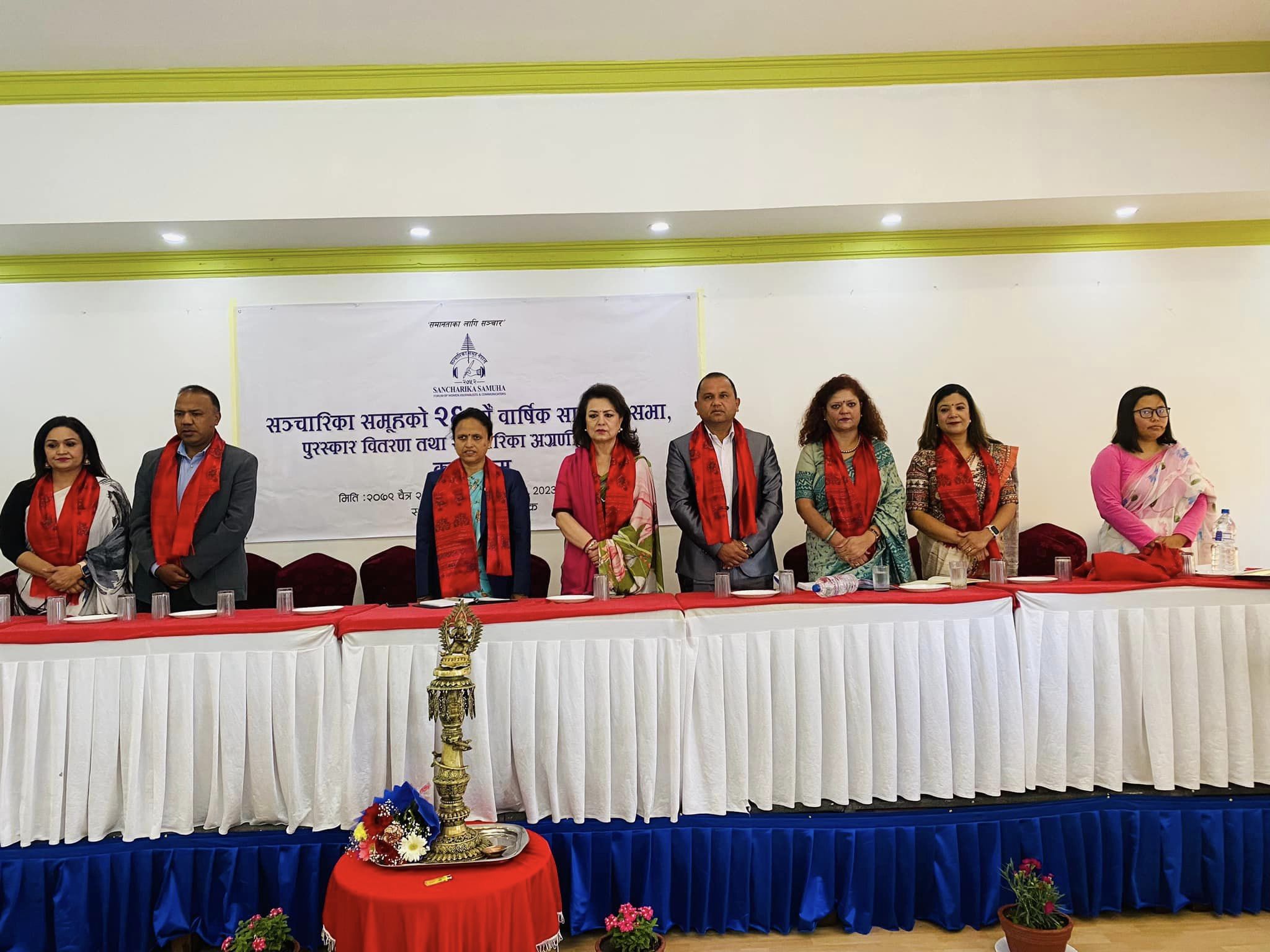

(Pabitra Guragain)
Minister for Communication and Information Technology, Rekha Sharma, has insisted on increasing women’s participation in the media.
In her address to an inaugural ceremony of the 26th AGM of Sancharika Samuha, an organisation of women journalists, in Lalitpur today, the Minister echoed the need of an increased women’s access to information technology (IT) and roles in media. “The development of mass communications and IT was not possible in a true sense by leaving the women community behind.”
The Government Spokesperson further said, “The government is serious about the issues concerning women journalists and promoting their access to IT. It expects inputs and cooperation from the stakeholders concerned to determine the government policies, plans and actions ahead for the cause of women journalists.”
The Minister hopes that a media academy envisaged by the Mass Communications Bill would help promote and enhance professional skills among women journalists.
“Women rarely get opportunities unless their participation is legally required,” the Minister said. She went on to say that she wished to see women’s larger participation in mass media and the IT sector. The development of women who make up over 50 percent of the population in Nepal paves the way for holistic human development, according to the Minister.
Recalling the moment when she was oriented by journalists associated with the Sancharika Samuha about the procedures of formulation of laws and policies as a lawmaker around a decade ago, the Minister stressed on the need of women’s creative roles in media. “Women journalists should be provided a ground to cultivate and explore their creativity and potential strength.”
Also Speaking on the occasion, Press Council Nepal Chair Balkrishna Basnet said the women’s leadership in media should be fostered. Urging women journalists to give continuity to study, work hard and seek ways for exploring their potentialities, he said women’s retention in media was necessary.
Senior Vice-Chair of Federation of Nepali Journalists, Ramesh Bista, said, “The FNJ is an inclusive organisation and 17 percent of its members are women.” He urged the Sancharika Samuha and media organisations to take the issues of ‘online harassment and newsroom harassment’ against women very seriously, bringing it to a wider discourse. “To be honest, the existing media scenario is not women-friendly. Women journalists are highly vulnerable to online and newsroom harassment,” the journalist leader said.
During the programme, it was shared that a recent research showed 88 percent women journalists experience online violence in Nepal.
He also took time to call for ending women’s ceremonial roles in the leadership level. The senior vice chair of the umbrella organisation of journalists asserted that women journalists deserved opportunities to hone professional skills.
Working Women Journalists President Sangita Lama and Sancharika Samuha founding president Bandana Rana, former presidents Babita Basnet and Nirmala Sharma were univocal for increasing the presence of women in media by ensuring their professional rights and security.
Founding president Rana, a member of the United Nations (UN) Committee on the Convention on the Elimination of all forms of Discrimination against Women (CEDAW), recalled the moments how she was inspired from participation in the 1995 Beijing Platform for Action to establish the organisation. It may be noted that the 1995 BPA concluded by identifying 12 key areas of concern including Women and Media requiring urgent action to advance towards a greater equality and opportunities for women.
On the occasion, Rita Gurung and Surya Kumari Pant were conferred the Sancharika Agrani Samman and journalist Srijana Khadka won the Sancharika Samanata (Equality) Award carrying a purse of Rs 20,000.
Likewise, Rina Thapa bagged the Uma Singh Journalism Award carrying a purse of Rs 10,000 and Nisha Shrestha and Gyanu Ghimire were conferred the Sancharika Protsahan Puraskar carrying a purse of Rs 10,000 each.
Receiving the award, Khadka shared with the gathering that she was passionate to raise women and social issues in media as it was yet to recognize such agenda as the issues of priority. “Issues of women are yet to be mainstreamed,” she said, adding that she was struggling to bridge such gap in the media.
Sancharika Samuha, Nepal (SASN), a forum of women journalists and communicators, was established in April 1996.